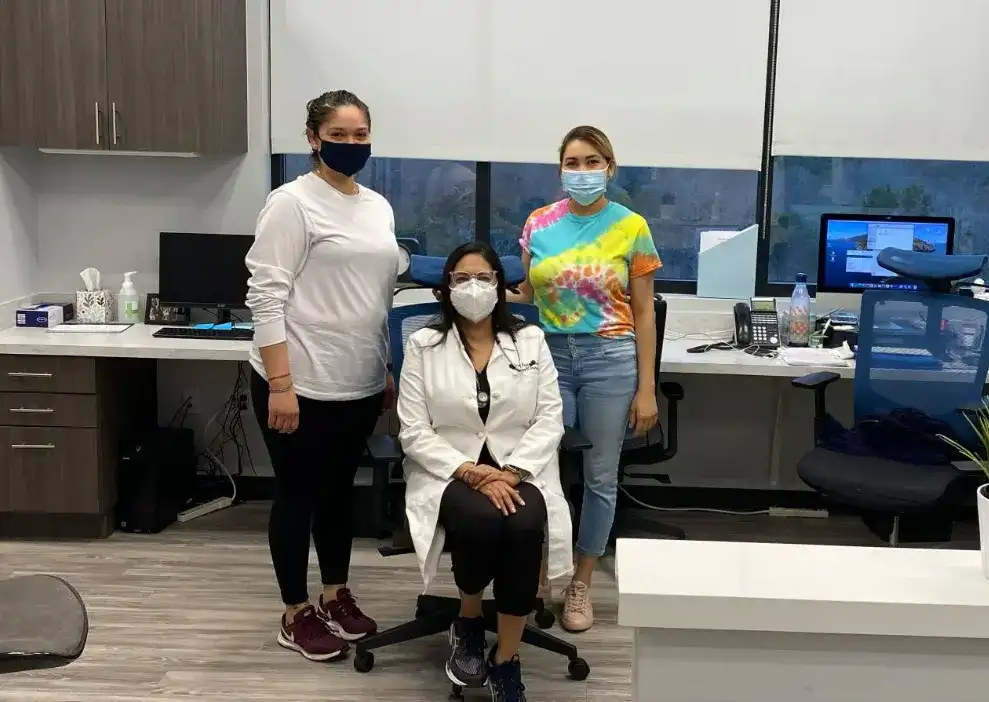What is a food allergy?
A food allergy occurs when an individual's immune system overreacts to a particular food substance. The immune system is primarily responsible for defending the human body against germs. However, when a person has a food allergy, their body mistakenly believes that food is dangerous and proliferates signals to attack an otherwise harmless substance.
Feel better faster with our Food allergists in Austin

Living with food allergies can turn every meal into a source of anxiety and discomfort. You might experience unexpected reactions, struggle to identify trigger foods or feel overwhelmed managing your diet.
The constant worry about cross-contamination at restaurants and social gatherings can make eating out feel impossible. Even grocery shopping becomes a time-consuming task as you carefully read every label. But there's no need to let food allergies control your life any longer.
Our experienced food allergists in Austin provide comprehensive food allergy testing, personalized treatment plans, and practical strategies to help you navigate daily life with confidence.
Our allergist in Austin works with you to identify your specific triggers, develop an effective management plan, and teach you how to prevent reactions.
How do I know if I have a food hypersensitivity?
The symptoms of food allergies will typically occur a few minutes up to 2 hours after consuming a particular food. Symptoms rarely manifest after 4 to 6 hours. The most common symptoms of food allergies include:
- Vomiting, diarrhea, and/or abdominal pain
- Hives, eczema, and/or bodily swelling
- Itching or swelling of the lips, tongue, or mouth
- Itching or tightening of the throat
- Difficulty breathing and/or wheezing
- Dizziness or feeling faint due to lowered blood pressure
What foods cause allergic reactions?

Although any food can cause an allergic reaction, most food allergies occur with exposure to the top eight food allergens:
- Peanuts
- Tree nuts (such as walnuts, almonds, Brazil nuts, cashews, macadamia nuts, pecans, pine nuts, and hazelnuts)
- Eggs
- Soy
- Wheat or other grains
- Shellfish
- Fish
- Cow’s milk
Which medications interfere with food allergy testing?
People should discontinue taking antihistamines and antidepressants before undergoing allergy skin testing, as these medications may interfere with the food allergy test results.
It is essential to consult your healthcare provider regarding any questions you may have. Prior to ceasing any of these, ensure that you have consulted your healthcare provider.
How does our food allergist diagnose your allergy
Although there are no definitive treatment options to cure a food allergy completely, there are some ways you can manage it.
Initial Consultation
At Frontier Allergy Asthma and Immunology, your food allergy specialist begins by obtaining vital information about your symptoms and family history. This step helps identify potential food substances that may be causing issues.
Diagnostic Tests
To gain a comprehensive understanding, the specialist will conduct skin prick tests and blood tests. These tests provide crucial data about what foods could potentially trigger an allergic reaction.
Elimination Diet
Based on the test results, your food allergy doctor may recommend an elimination diet. This process involves:
- Removing specific foods from your diet.
- Gradually re-incorporating these foods one by one.
- Monitoring your symptoms to identify any adverse reactions.
Oral Food Challenge
Ingesting measured amounts of a potential food allergen in increments over a set period. Determining if a food you were previously allergic to can be safely added back into your diet.
Emergency Plan
Your allergist will provide a detailed emergency plan and prescribe an epinephrine auto-injector (EpiPen) for you to carry at all times. This ensures you are prepared to manage any unexpected allergic reactions safely.
We use effective biologics treatment to treat food allergies
Biologics offer a new hope for managing food allergies, particularly for those at risk of severe reactions.
Below, we’ll explore how these treatments work, their benefits, and considerations for use.
What Are Biologics?
Biologics are medications made from living organisms, such as cells, and they target specific parts of the immune system involved in allergic reactions.
Unlike traditional drugs, they’re designed to be precise, focusing on pathways like immunoglobulin E (IgE), which triggers allergies.
FDA Approval and Usage
Omalizumab (Xolair) was approved by the FDA on February 16, 2024, for reducing allergic reactions, including anaphylaxis, in people with multiple food allergies, for both adults and children as young as 1 year old.
It’s given as an injection every 2-4 weeks and helps increase tolerance to allergens like peanuts, tree nuts, eggs, milk, and wheat, as shown in a study (New England Journal of Medicine).
Advantages of Biologics
Biologics offer several advantages, making them a promising frontier in food allergy treatment:
- Targeted Approach: By focusing on specific immune pathways, biologics can reduce allergic reactions more effectively and with potentially fewer systemic side effects compared to broad-spectrum treatments.
- Potential for Multiple Food Allergies: Omalizumab, for example, can protect against reactions to multiple allergens, addressing a common challenge for patients with polysensitization.
- Adjunctive Therapy: Biologics can be used alongside other treatments like OIT, enhancing safety by reducing reaction risks during desensitization processes.
- Non-Allergen Specific: Unlike allergen-specific immunotherapies, biologics act in an antigen-independent manner, targeting the allergic response itself rather than the individual.
Frequently Asked Questions
Will insurance cover food allergies in Austin?
- Most health insurance plans in Austin cover food allergy diagnosis and treatment, including consultations with an allergist, allergy testing, and necessary medications. However, coverage details can vary, so it's best to check with your insurance provider.
Can food allergies be cured?
- Currently, there is no cure for food allergies, but allergy management strategies include avoiding allergens, carrying emergency medications like epinephrine, and sometimes undergoing oral immunotherapy.
Are food allergies genetic?
- Food allergies can have a genetic component, often running in families. If a parent has allergies, their children are more likely to develop them. However, environmental factors and individual immune responses also play significant roles in the development of food allergies.
Can an Austin allergist help create a personalized diet plan to avoid allergens?
- Yes, our allergist in Austincan create a personalized diet plan by identifying your specific food allergens through testing, offering tailored advice to avoid triggers, and suggesting safe alternatives, ensuring you manage your allergies effectively while enjoying Austin’s diverse food scene.
What should I do if I accidentally eat something I’m allergic to?
- Yes, our If you accidentally eat something you’re allergic to, stay calm, take your prescribed antihistamine immediately, and monitor symptoms. If you experience severe reactions like difficulty breathing or swelling, use your epinephrine auto-injector and seek emergency care in Austin right away.
Take the first step toward food freedom – schedule your consultation with our food allergist today.
If you are interested in further discussion about your specific needs, Dr. Reshamwala is happy to see you and answer any questions you may have. Please call (512) 535-2655 or email clinic@frontierallergist.com to schedule an appointment today! Book an appointment
Written by: Dr. Neha Reshamwala
NPI number: 1780874578
Page last reviewed: 03/20/21


